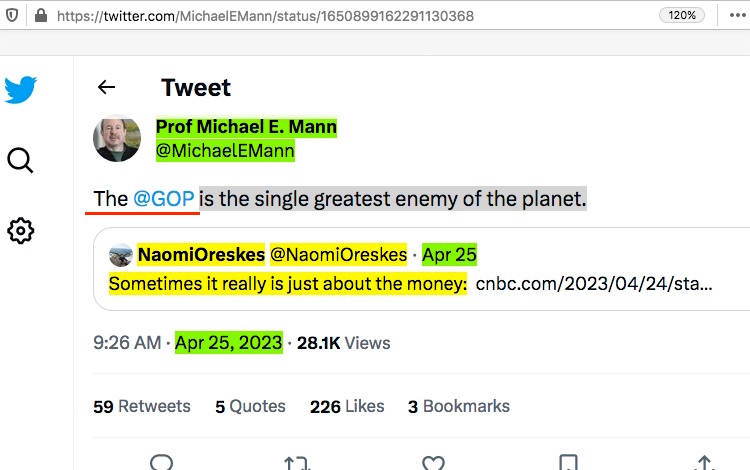I was alerted to this particular “The Mann” / Naomi Oreskes Twitter situation in the screencapture below back in late April right at the beginning of my home residence upheaval, and only just today have a window of opportunity to offer some observations. Dr Michael Mann was quote-retweeting Oreskes’ tweet about a CNBC article which essentially implied fossil fuel money bought influence with Republican officials. Dr Mann, you might notice here, didn’t do anything to bolster his personal image with that tweet. This doesn’t work out well for Oreskes, either, or as it turns out, for her long ago “Merchants of Doubt” co-author Erik Conway.
Tag Archives: Erik Conway
Headline: “U.S. House Panel Commits Political Suicide; Expands Inquiry into Climate Disinformation by ‘Big Oil’”
That was the widespread news headline, in one form or another (minus the ‘political suicide’ bit, of course) on Thursday, September 16th, 2021. The main news item was that Oversight Chairwoman Carolyn Maloney, D-NY, and sophomore-term House member Ro Khanna, D-Ca, sent letters hours earlier to four major fossil fuel companies and two lobbying groups, demanding that they appear in front of the Oversight Committee on October 28, and that they bring documents with them showing how they were engaged in — no joke! — “in a long-running, industry-wide campaign to spread disinformation about the role of fossil fuels in causing global warming.” Those were the actual words in the nearly identical letters, which can be viewed in their entirety at the links within the Oversight Committees website page’s press release.
How could this House Oversight Committee stunt be revealed to be act of political suicide? If the ‘defense witnesses’ at the October 28 hearing decide to seize the leadership opportunity on this, they could show how the ‘industry executives colluded with skeptic climate scientists in disinformation campaigns‘ accusation only points a huge arrow at where the real disinformation efforts are apparently seen in this issue, a core clique of enviro-activists who’ve pushed a pair of never-implemented, ‘leaked industry memo sets’ that are worthless to prove any “industry-wide campaign to spread disinformation” exists anywhere. Plus, the sheer lack of viable evidence behind the accusation points an even bigger arrow at the basic journalistic malfeasance on the part of mainstream media news reporters, when it comes to their decades-long failure to ask probing questions about the basic accusation, which dates back to the 1990s. Continue reading
The Big Erik Conway Problem, Pt 2
What’s particularly maddening about this problem is the simplicity of its flip side, a crystal-clear snapshot of the way Naomi Oreskes, with her Merchants of Doubt co-author Erik Conway, supposedly exposed how public confusion over climate science results from organized campaigns designed to create confusion and delay political action, a tactic previously employed in efforts to deny the reality of acid rain, ozone depletion, and the link between tobacco and cancer, tactics now used in some cases by the same people who deny the reality of global warming. But in my November 18, 2017 blog post, I used Conway’s own words to show how the timeline of Oreskes’ so-called discovery of her ‘tobacco industry-connected’ critics fell apart, and the problems don’t stop there. Conway’s account of his collaboration with Oreskes on this ‘tobacco industry-connected climate scientists’ matter doesn’t offer a clearer picture of why atmospheric physicist Dr S Fred Singer was seemingly “the most dangerous man on the planet”, it begs for deeper investigation of why and how this portrayal of him coalesced in the first place. Continue reading
Oreskes’ Inability to Keep Her Mouth Shut & the Big Erik Conway Problem
In telling the tale of inadvertently discovering how skeptic climate scientists are corrupted, a person might be viewed as a hero or heroine, and it is understandably forgivable if the hero/heroine has a memory lapse about exactly when this event happened, or about minor narrative details surrounding it. But when the tale takes on an increasing appearance of being a fabrication designed to make the person look like a hero/heroine, unbiased objective thinkers will start to wonder why there would be any necessity for that kind of embellishment, and they might also wonder if there is something inherently wrong with the core of the tale. Continue reading
To be Credible, you must Keep Your Story Straight, Pt 2: “Oreskes’ timeline problem”
I’ll repeat with what I concluded in Part 1, but more succinctly: for an authoritative storyteller to mesmerize an audience, the story must never contain an element where the audience blurts out, “wait a minute, what you just said can’t be right,” otherwise whatever point there was to the story disappears at the exact same moment when the storyteller’s credibility implodes.
If the storyteller’s credibility implodes, it will not matter how good the story is. As a storyteller, one might have written a good manuscript; maybe the person would have even hired proofreading services in London or at their place to get the manuscript ready; talked to publishing houses or even contacted editors. But all this might just go in vain if the credibility of the storyteller implodes. It will just have a negative impact on the story and the one who is writing it to mesmerize the audience.
Now, see how Harvard History of Science professor Naomi Oreskes‘ inadvertently elicits that exact response from her audience, via her tale of the events which led her to explore the notion that skeptic climate scientists operate in a manner parallel to what ‘expert shills’ did for the tobacco industry. Continue reading
Worried about Global Warming or Ozone Depletion? Then Destroy Critics Who Say Those aren’t Problems.
Think about that line of reasoning for a moment. If you are fearful of climate catastrophe, wouldn’t you welcome the critics’ good news? Enviro-activists don’t, and I don’t try to analyze why. What I can do is tell how particular people reveal a one-and-the-same character assassination effort against critics of global warming and ozone depletion. Continue reading

